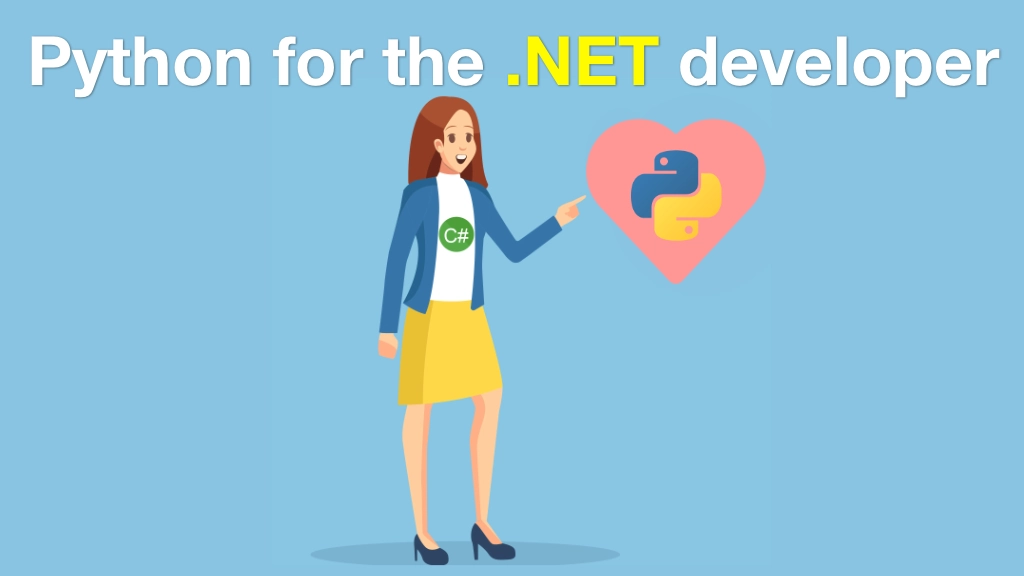Python for .NET Developers Transcripts
Chapter: Welcome to the course
Lecture: What you'll learn
Login or
purchase this course
to watch this video and the rest of the course contents.
0:00
This course is going to be full of hands on examples using awesome Python technologies libraries, language features and so on.
0:08
So let's quickly talk about what you'll learn. First thing that we're going to do we're going to spend a fair amount of time on
0:13
is just the Python language itself. But, like C#, the Python language is just the tip of the iceberg. There's an entire standard library
0:22
what Python calls their Base Class Library from .NET as well as many, many, many external libraries
0:29
that we can bring in and use to build amazing applications. But first, we're going to focus on a solid foundation
0:34
with the Python language and we're going to be using an editor called PyCharm. This is by the same company that creates things like
0:42
Resharper that plugs into Visual Studio and makes it awesome. Use a whole IDE specifically built to make writing Python code amazing.
0:50
After that, we're going to focus on object oriented programming. Python has amazing object oriented programming features
0:56
and we're going to do a whole chapter on that. As I hinted with my many, many, many packages yes, there are many packages in the package management
1:05
framework or location that puts these all together and lets us install packages that extend our Python application, called the Python Package Index
1:14
often referred to as PyPI for short. We're going to see how we can use PyPI to manage packages in our application and how those packages
1:22
make our application do amazing things in just a couple lines of code. Having a good understanding of how your application
1:29
runs requires a good understanding of how your code in general is run on that platform. Then, we're going to spend a whole chapter thinking about
1:36
Python's memory management and how it manages memory for you and what that means for runtime consideration.
1:42
So, we're going to dig into Python's memory management. After that, it's time to start building rich applications.
1:48
So, we're going to build an awesome web application with Flask, this is like ASP.NET NVC but for the Python world.
1:56
And, of course, web apps require database access. In .NET we have Entity Framework in Python we have SQLAlchemy
2:04
along with a handful of other amazing ORMS. So, we're going to use SQLAlchemy to build a database backend for our web app.
2:11
Of course we want our code tested we want it to be reliable, don't we? So, we're going to use the application library
2:18
called pytest that lets us write unitests in a really clean and factored way. If you want to get a lot done, sometimes that requires
2:25
parallelism, so we're going to explore the async and await keyword. No, not in C#, maybe a little bit but we're going to explore in Python
2:34
because Python also has the async and await keywords and Asyncronous methods that are going to be super familiar to you as a .NET developer.
2:42
What might not be so familiar what might be new, and is really amazing is something called Jupyter. Jupyter Notebooks and Jupyter Lab.
2:49
These are computational notebooks that are very different from traditional applications you would write.
2:54
They execute piece by piece with lots of visualization and exploration, so we're going to go explore two different types of data using Jupyter
3:04
Jupyter Notebooks, and Jupyter Lab. Then, we're going to round out the course by taking our data driven web app that we built in Flask and deploying it
3:12
on Linux, in the cloud. So, we're going to work with Ubuntu with uWSGI and Nginx to properly deploy our app. So, it performs amazingly on a super cheap
3:21
virtual machine in the cloud. That's it. Of course, we're covering more there's many little things that we're touching on
3:28
but here's the big summary of the topics we're going to cover. Think of all the things that you could do
3:33
with all this technology after you've taken this course. You're going to be on fire.
